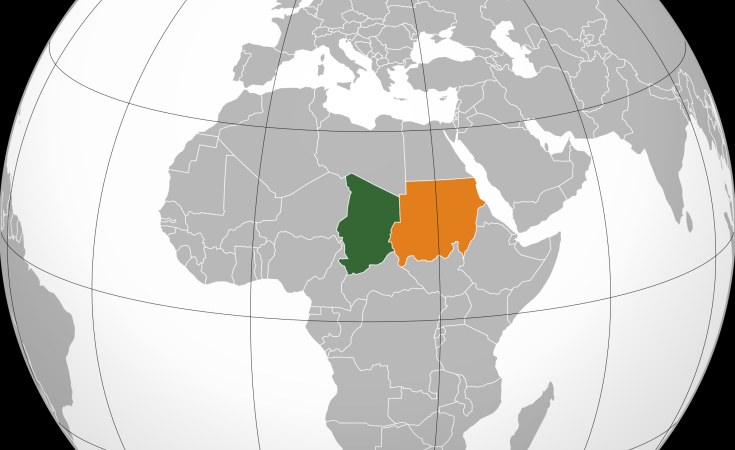Chad is hosting more than 1 million people forced to leave their homes, including nearly 400,000 Sudanese refugees. Chad fears the conflict between rival army generals will pile more pressure on its limited resources.
Antoine, a Congolese man who has been living in Sudan for around 20 years, is desperate to flee the country amid heavy fighting. His closest safe destination is neighboring Chad.
He told DW that living conditions have worsened since the start of clashes between Rapid Support Forces (RSF) led by General Mohammed Hamdane Daglo and the national army of General Abdel Fattah al-Burhane.
Antoine explained that they haven't had any food to eat nor electricity to use for several days.
The RSF's rear base is over 1,000 kilometers (around 620 miles) away, close to Sudan's border with Chad.
At risk
Those waiting to cross over into Chad say they live under the threat of the bombings which target a camp close to the paramilitaries.
"There are smells because there are the bodies of people who died and so far, have not been collected," Antoine said.
"We risk having cholera. We sleep on the ground and some sleep-in containers. You know that when it is hot, the container also heats up, and you can resist and stay inside. There is even snakes at this place where we sleep. There are lots of mosquitoes, too."
A fragile cease-fire -- which has been in place since Tuesday -- has allowed many Sudanese and other foreign nationals to flee for safety, and many of them went to Chad.
Bijou, a national of another African country, is hoping to travel to Chad or get evacuated to another country.
"We suffer a lot here," Bijou said. "Fortunately, the soldiers of Daglo give us some bread and food. Since the war began, we have gone several days without eating."
Threat to Chad's security
Chadian authorities are concerned that the ongoing clashes in Sudan would compromise the security and humanitarian situation within their own territory as thousands of people -- mostly women and children -- continue to seek refuge.
Chad's defense minister, Daoud Yaya Brahim, told DW that he was worried about the flow of refugees.
"We have over 400,000 Sudanese refugees who have been with us since 2003," Brahim said. "Chad will suffer [in terms of] security," he said. "Many measures and arrangements have been made to secure our border."
Officials of the Economic and Social Development Agency (ADES), a Chadian humanitarian NGO, told DW that Chad could host more than 100,000 refugees very soon due to the fighting.
"Our teams counted about 20,000 people. It continues for example on the Khartoum side, also in the Nyala area. And in our humanitarian contingency plan we really expect a 100,000 of people who may cross the border to Chad," Abdelhakim Tahir, the director of ADES said.
Limited support for refugees
The World Food Program (WFP) has warned that the supply of food for refugees in Chad would be halved from next month due to a lack of financial support.
That means Antoine and Bijou may even struggle to cope with conditions should they cross over to Chad.
Tahir has warned of worsening humanitarian situation in Chad for refugees if the international community doesn't mobilize enough aid on time.
"It is a humanitarian catastrophe if the World Food Program has no resources. WFP is even the partner that mobilizes resources to address the food needs of refugees. But already for former refugees they have no resources and for the current influx there are not really resources," he said.
It is estimated that the WFP urgently needs just over $142 million over the next six months to sustain its program for refugees as well as provide vital food assistance to communities affected by the crisis in Sudan.
"Chad is under financed. The international community really must mobilize. We really fear the worst. Organizations will not be able to cope with this influx of Sudanese refugees," Tahir told DW.
Chad has been in political turmoil since the death of former President Idriss Deby Itno in 2021. Fresh elections have been delayed until October 2024 and at least 1 million people are affected by devastating flooding, which all add to the woes of the impoverished Central African nation.
Edited by: Keith Walker


